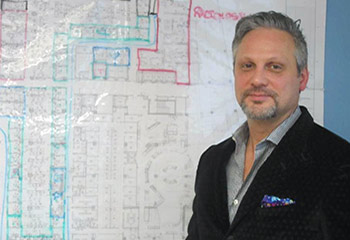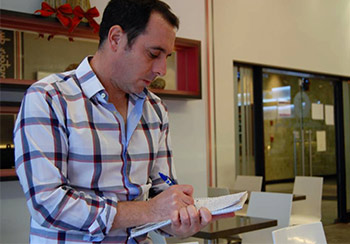'Gorillas' in our midst
A team of McGill University social scientists is using ethnographic research to study the organizational work involved in the unprecedented transition of the McGill University Health Centre (MUHC) to its new location at the Glen site. Since last September, the scientists have been observing and interviewing the staff of two MUHC units. They are documenting how teams work together and how they adapt to technology and space, before and after the transition.
 Left to right: Peter Nugus, Samer Faraj, Julia Kryluk, A.J. Rubineau, Carla Sayegh and Shawn Errunza have been documenting how two MUHC units adapt to the move to the Glen.
Left to right: Peter Nugus, Samer Faraj, Julia Kryluk, A.J. Rubineau, Carla Sayegh and Shawn Errunza have been documenting how two MUHC units adapt to the move to the Glen.
“The transfer of four MUHC hospitals and institutions to one new location is one of the most monumental restructuring of services in Quebec history and one of the biggest reorganizations of health services in the world. It involves $2.7 billion, 4,000 staff members and hundreds of thousands of patients,” says Sociologist, Ethnographer and Co-investigator Dr. Peter Nugus, assistant professor in the Department of Family Medicine and Centre for Medical Education at McGill University. “Hospitals are high-functioning complex organizations, with intense specialization. This project is going to shed light on the processes of the transition and provide lessons not only for other healthcare organizations, but also for non-health systems throughout the world.”
The research team targeted the Royal Victoria Hospital (RVH) Emergency Department (ED) and the newly-merged Neonatal Intensive Care Units (NICU) of the RVH and the Montreal Children’s Hospital (MCH).
“The ED is always at the frontline of the organization and, what many don’t realize, ends up serving as a kind of a funnel for the entire health system,” says Nugus. “The NICU, for its part, will be taking a double hit. Besides the move to the Glen, the RVH’s NICU, which treats mainly very early-term babies who are acutely unwell, will have to combine its processes and staff with the MCH’s NICU, which tends to treat later-term newborns – bigger babies but often with bigger health problems. Because the babies treated in the two units have different types of issues, the staff work in different ways. These units will have to resolve differences and harmonize the way they work together.”

“Communication and organizational expertise in health care should be recognized,” says Dr. Frederic Dankoff, medical coordinator for Bed Management and Patient Flow at the MUHC adult sites.
According to Dr. Frederic Dankoff, medical coordinator for Bed Management and Patient Flow at the MUHC adult sites, both the social sciences and the business world could profit from change management know-how developed in hospitals.
“There’s a lot of communication and organizational expertise in health care that needs to be recognized. In the ED we are constantly and quickly adapting to new procedures and policies, to changes in other departments such as cardiology or surgery and, of course, to the inflow of patients.”
Dr. Dankoff gave the team of ethnographers “carte blanche” to shadow his staff, take notes and ask questions.
“I have no idea what they jot down on their notepads! It’s like Jane Goodall observing the gorillas in their habitat in Tanzania,” he says laughing. “I hope they get a true image of how we respond to the transition.”
Throughout the process, patient and staff confidentiality are taken seriously.
“Our shadowing is done with the sanction of an ethics committee,” Dr. Nugus says. “We don’t target, judge or evaluate individuals. We look at the context and processes – situations in which anyone could find themselves and which offer lessons beyond that setting. We watch what people do and then we ask them to account for their behaviour. People’s opinions are important because they orient their actions.”

“MUHC staff worked on improving practices and procedures during the transition period,” says Sociologist and Ethnographer Dr. Peter Nugus.
Dr. Nugus, who has studied and compared some of the biggest emergency departments in the world, is often amazed by the “tremendous repertoire of organizational knowledge and skills developed by healthcare workers.” As he observed, this expertise was put to the test during the first phase of the transition at the MUHC, with positive results.
According to Associate Dean of McGill’s Faculty of Management and Co-investigator Dr. Samer Faraj, amidst the evident and understandable anxiety, there was also optimism about opportunities for change. “Staff were trying to clarify processes and procedures of how they work with each other and with other units,” he says. “They were also questioning their practices and trying to improve them.”
“When clinicians, staff and managers feel they can do something creative to influence their own work environment, they become more engaged and invested in their work,” Dr. Nugus adds. “The whole process builds trust in an organization.”
Dr. Dankoff is well aware that important changes were already happening before the move started.
“The process continues at the Glen. In spite of the training and preparation, clinical activities didn’t take off at 100 per cent right away,” he says. “We started re-training in the new environment as soon as we moved.”
Dr. Nugus and his team are there, like the anthropologists in the hill tribes of Thailand, documenting everything.
"Dr. Nugus and Dr. Faraj received a grant from the Social Sciences and Humanities Research Council (SSHRC). In addition to Dr. Dankoff, Dr. Thérèse Perrault, MUHC Neonatology director, PhD candidate in the Management Faculty Carla Sayegh, Researchers A.J.Rubineau, Shawn Errunza and Julia Kryluk, and leading Finnish social scientists Yrjö Engestrom and Anu Kajamaa are also part of the research team."
